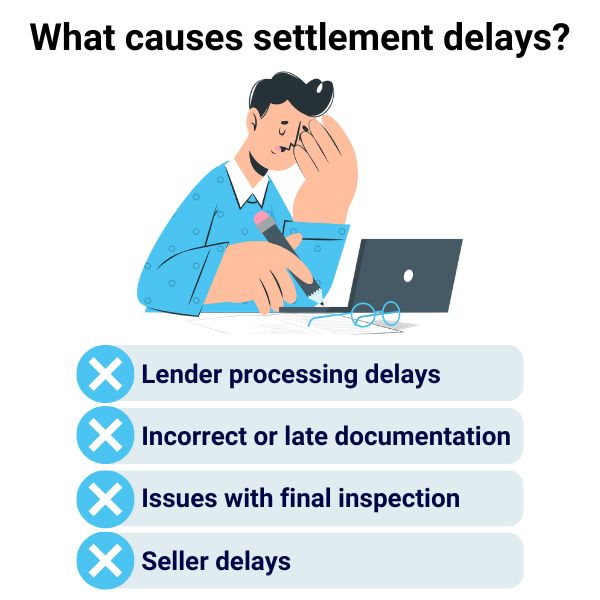Settlement is the last hurdle before a property transaction is completed — everything else that needs to be squared off should be before the settlement date. In some cases, however, settlements can become delayed, causing a great deal of uncertainty to both buying and selling parties.
Depending on which party caused the delay for the settlement and the reason for the delay, there can be major issues for the transaction such as additional costs, or even a falling through of the sale agreement. Read on to find out what happens when a settlement is delayed and what actions you can take to protect your own interests.
What causes settlement delays?
Lender processing delays
Both sellers and buyers rely on lenders and banks to facilitate the transfer of funds for the settlement. When processing issues arise with a lender, this can put the brakes on settlement until the issue has been resolved.
On the side of buyers, this delay is most often around the approval of a home loan — without approval from the lender, the deal cannot proceed. For sellers, lender delays may be concerning the release of an existing mortgage. In both cases, it’s important to understand that lenders have their own processing times and are not obliged to meet the settlement deadline set — this responsibility falls to the buying and selling parties involved.
Incorrect or late documentation
Every part of the conveyancing process must be fulfilled accurately, and this is especially so for key documents like the Transfer of Land and the Contract of Sale. Any discrepancy with the legal names on the documents will result in delays later on. Similarly, documents that are filled out and delivered late can also end up delaying settlement.
Issues with final inspection
Buyers may discover an issue with the condition of the property during final inspection. If rectification of this issue was listed in the contract of sale as a requirement, the buyer may insist on a resolution before proceeding with settlement.
Seller delays
Unresolved issues on the seller’s side can also result in a delayed settlement. For example, the seller may require more time to move their possessions out of the home, or a tenant who should have been evicted still has not moved out.
Are there cost implications if you delay settlement?
Yes. Delays to the settlement cause disruption and inconvenience to the other party, which will more often than not be entitled to ask for compensation for the delay. The cost implications of delaying settlement come in the form of penalty interest on the unpaid purchase price of the property (usually 10%), which is charged based on the length of the delayed period till settlement.
Can I take legal action?
If the settlement has been delayed by the other party, you may be able to take legal action straightaway by choosing not to grant them an extension of time. If you refuse a grant of extension, you can wait until the close of business on the settlement date and send a notification to the other party that you are “ready, willing, and able” to settle.
If they do not settle by the required time, legal action can be taken to sue them for damages or even obtain specific performance where a court would force the other party to settle.
What should I do if I can’t make a settlement date?
Regardless of the reason for not being able to meet the settlement date, the right course of action is to get in touch with your conveyancer or solicitor and send an extension request to the other party. The other party may grant an extension period at their discretion – but they are not obliged to do so.
Communicate any foreseeable delays as soon as possible to avoid last-minute extensions, which are less favourable to the other party.
Is there a settlement time limit?
In most states and territories in Australia, there is usually a set grace period for parties to try and resolve the issue before more costly consequences are applied.
Queensland
No grace period past the settlement date, both sellers and buyers can refuse a request from either party to delay the settlement and terminate the contract. Alternatively, they can also allow for the extension and charge default interest on the extra time it takes to resolve the issue.
New South Wales
Both buyers and sellers can issue a Notice to Complete to the delaying party, usually a 14-day period, to allow for the issue to be resolved. In this period, sellers can charge default interest to buyers and terminate the contract at the end of the period. Buyers, on the other hand, are usually unable to charge sellers interest for the delay period but can still terminate the contract at the end.
Victoria
Sellers have the right to charge penalty interest to buyers, but they don’t necessarily have to. Buyers don’t share the same rights and are usually left with finding a beneficial solution from the seller. The exact amount of penalty interest will usually be specified in the contract and will be calculated on a daily basis.
South Australia
Sellers can issue a Notice of Completion to buyers who are unable to settle on the agreed date, usually a minimum period of 14 days while charging penalty interest on the delayed time. Buyers will be able to provide written notice to sellers to remedy the issue within 3 business days, following which they can postpone the settlement and charge penalty interest.
Western Australia
Both parties are given a period of 3 business days to rectify the issues before penalty interest is charged.
Northern Territory
Both parties are given a period of 10 working days to resolve the delay. Following this, buyers that delay settlement further will be subject to penalty interest, while sellers will be required to return the funds paid by the buyer, plus interest.
Tasmania
Parties can issue a Notice to Complete to the delaying side, which allows for a period of at least 14 more days to before settlement. If the issue is not resolved by then, both buyers and sellers can claim losses from the delaying party.






